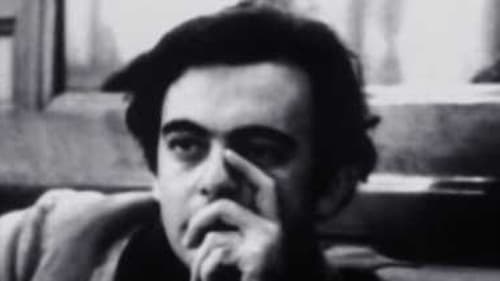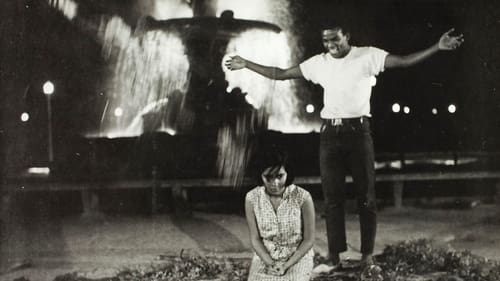Arnaldo Jabor
Birth : 1940-12-12, Rio de Janeiro, Rio de Janeiro, Brazil
Death : 2022-02-15
History
Arnaldo Jabor (1940-2022) was a Brazilian filmmaker, screenwriter, producer, playwright, critic, journalist, and writer. He is most famous in cinema for the making of "All nudity shall be punished" (1973), "I love you" (1981), and "Love me forever or never" (1986).

Self - Filmmaker (archive footage)
A deep investigation, in the way of a poetic essay, on one of the main Latin American movements in cinema, analyzed via the thoughts of its main authors, who invented, in the early 1960s, a new way of making movies in Brazil, with a political attitude, always near to people's problems, that combined art and revolution.

Himself
We live in a new age. We are always rushing, rushing for no reason, rushing for nothing. As though time had sped up. Everything implies speed, urgency. But ultimately, why does time seem so short? This film is about the director’s conflict about time and the lack of it in today’s world; she reflects on civilization and the future of existence.

Self

Producer
Shortly after World War II, the city of Rio de Janeiro experiments a period of great cultural, political and economic effervescence, when all the dreams – or nearly all – seem possible. In this exciting scenery of transformation, Paulo discovers love, friendship and sex through his childhood and adolescence in the 1950’s and 1960’s.

Screenplay
Shortly after World War II, the city of Rio de Janeiro experiments a period of great cultural, political and economic effervescence, when all the dreams – or nearly all – seem possible. In this exciting scenery of transformation, Paulo discovers love, friendship and sex through his childhood and adolescence in the 1950’s and 1960’s.

Director
Shortly after World War II, the city of Rio de Janeiro experiments a period of great cultural, political and economic effervescence, when all the dreams – or nearly all – seem possible. In this exciting scenery of transformation, Paulo discovers love, friendship and sex through his childhood and adolescence in the 1950’s and 1960’s.

Self (archive footage)
The remarkable story of Brazilian racing driver Ayrton Senna, charting his physical and spiritual achievements on the track and off, his quest for perfection, and the mythical status he has since attained, is the subject of Senna, a documentary feature that spans the racing legend's years as an F1 driver, from his opening season in 1984 to his untimely death a decade later.

Self
The life of a famous Brazilian film and television actor, including testimonials from people who knew him and worked with him, as well as excerpts from films and videos in which he acted.

Self
Documentary about the 68-generation, told through the story of the newspaper “O Sol”, one of the first vehicles of the alternative Brazilian press, produced daily for six months, in the 1960s. The newspaper spoke of culture, politics and education through satires and prominent figures in the cultural scene of the time passed through him. Archive scenes and music from the period seek to reconstitute the spirit of the 68-generation. The film has the participation of personalities such as Ziraldo, Zuenir Ventura, Arnaldo Jabor, Chico Buarque, Caetano Veloso, Carlos Heitor Cony, Fernando Gabeira, Betty Faria, Hugo Carvana, among others.

Himself

Documentary about Brazilian filmmaker Glauber Rocha, one of the most important names in the Cinema Novo, with interviews with some of his friends and colleagues.

Screenplay

Director

Producer
Young and recently separated couple meet in a modern house and start discussing their past relationship.

Writer
Young and recently separated couple meet in a modern house and start discussing their past relationship.

Director
Young and recently separated couple meet in a modern house and start discussing their past relationship.

Writer
Man meets woman, and invites her home. The two start an intense relationship in order to shield themselves from loneliness.

Director
Man meets woman, and invites her home. The two start an intense relationship in order to shield themselves from loneliness.

Producer
Middle-class family reform their apartment, and the noise, the contact with the workers and strange occurrences turn what was supposed to be a trivial matter into a trip to hell.

Writer
Middle-class family reform their apartment, and the noise, the contact with the workers and strange occurrences turn what was supposed to be a trivial matter into a trip to hell.

Director
Middle-class family reform their apartment, and the noise, the contact with the workers and strange occurrences turn what was supposed to be a trivial matter into a trip to hell.

Writer
18-year-old Glorinha finds herself on the eve of her wedding when a series of revelations plague her and her circle of family and friends. Dr. Camarinha, friend of Sabino, his father, who is a a wealthy construction entrepreneur, says Glorinha's fiancé is homosexual. Glorinha, for his part, reveals to him that she had been a lover of his dead son, Antônioa year ago. Sabino reveals to Noemia, his secretary with whom he ends up having a sexual relationship, who had experienced a homosexual practice as a child and calls her by the name of his daughter. Noemia, in turn, Xavier's mistress, who lives with a leprous woman who has long since cared for, reveals to him that she no longer intends to be his mistress. Glorinha goes with her father to a deserted beach, where she makes insinuations that she loves him and, when kissed by her father, runs desperately and tells her mother that her father had tried to rape her. Xavier, in turn, assassinates Noemia in the office.

Director
18-year-old Glorinha finds herself on the eve of her wedding when a series of revelations plague her and her circle of family and friends. Dr. Camarinha, friend of Sabino, his father, who is a a wealthy construction entrepreneur, says Glorinha's fiancé is homosexual. Glorinha, for his part, reveals to him that she had been a lover of his dead son, Antônioa year ago. Sabino reveals to Noemia, his secretary with whom he ends up having a sexual relationship, who had experienced a homosexual practice as a child and calls her by the name of his daughter. Noemia, in turn, Xavier's mistress, who lives with a leprous woman who has long since cared for, reveals to him that she no longer intends to be his mistress. Glorinha goes with her father to a deserted beach, where she makes insinuations that she loves him and, when kissed by her father, runs desperately and tells her mother that her father had tried to rape her. Xavier, in turn, assassinates Noemia in the office.

Narrador

Producer
A rich, spoiled young man encounters a prostitute and gets confused about the nature of his feelings for her. He can't decide between attraction and repulsion.

Writer
A rich, spoiled young man encounters a prostitute and gets confused about the nature of his feelings for her. He can't decide between attraction and repulsion.

Director
A rich, spoiled young man encounters a prostitute and gets confused about the nature of his feelings for her. He can't decide between attraction and repulsion.

The importance of the Cannes Film Festival in world terms and what it represented for Brazil in 1971. For Brazilian cinema, Cannes 71 represented the transition from film to industrialized production. It is the meeting of producers, technicians, critics , celebrities in general, offering opportunities for greater knowledge and renewal of values

Editor
This Brazilian film is set during the period of its initial colonial discovery and settlement. The title refers to a word the native peoples used for the coastal lands: "pindorama," or "place of the small trees." A ponderous and grandiose film, it was roundly booed when it was aired at the 1971 Cannes Film Festival.

Producer
This Brazilian film is set during the period of its initial colonial discovery and settlement. The title refers to a word the native peoples used for the coastal lands: "pindorama," or "place of the small trees." A ponderous and grandiose film, it was roundly booed when it was aired at the 1971 Cannes Film Festival.

Writer
This Brazilian film is set during the period of its initial colonial discovery and settlement. The title refers to a word the native peoples used for the coastal lands: "pindorama," or "place of the small trees." A ponderous and grandiose film, it was roundly booed when it was aired at the 1971 Cannes Film Festival.

Director
This Brazilian film is set during the period of its initial colonial discovery and settlement. The title refers to a word the native peoples used for the coastal lands: "pindorama," or "place of the small trees." A ponderous and grandiose film, it was roundly booed when it was aired at the 1971 Cannes Film Festival.

Intérprete
Chronicles the life of a 17 year-old girl living in the upper-class Rio de Janeiro neighbourhood of Ipanema. Márcia lives a life of parties and spend her days among bohemians, musicians and intellectuals. While seeming happy in the outside, she's extremely anguished inside. Based on the famous song by Antonio Carlos Jobim and Vinicius de Moraes.

Editor
Documentary about middle-class people in Rio de Janeiro, in the 1960s, when Brazil was going through a hard period in its history, with the military coup and the following dictatorship. Interviews with people in the street disclose their fears, aspirations and political alienation.

Producer
Documentary about middle-class people in Rio de Janeiro, in the 1960s, when Brazil was going through a hard period in its history, with the military coup and the following dictatorship. Interviews with people in the street disclose their fears, aspirations and political alienation.

Screenplay
Documentary about middle-class people in Rio de Janeiro, in the 1960s, when Brazil was going through a hard period in its history, with the military coup and the following dictatorship. Interviews with people in the street disclose their fears, aspirations and political alienation.

Himself
Originally produced for German TV, Improvised and Purposeful is a firsthand look at the "Cinema Novo" movement (otherwise known as the 'Brazilian New Wave'). Director Joaquim Pedro de Andrade focuses on six Cinema Novo filmmakers working in Rio in 1967.

Director
Documentary about middle-class people in Rio de Janeiro, in the 1960s, when Brazil was going through a hard period in its history, with the military coup and the following dictatorship. Interviews with people in the street disclose their fears, aspirations and political alienation.

In search of a better life, Luzia leaves the Northeast of Brazil and goes to Rio de Janeiro, looking for her fiance who went first to pave their way. Alone in the Marvelous City, she is forced to accept the friendship and protection of Calunga and, later, the company of Inácio.

Narrador

Producer

Narrator (voice)

Writer

Director

Co-Writer
Statistics, interviews and historical information on illiteracy and inequality in land distribution in Brazil's countryside.

Executive Producer
Statistics, interviews and historical information on illiteracy and inequality in land distribution in Brazil's countryside.

Sound Recordist
Statistics, interviews and historical information on illiteracy and inequality in land distribution in Brazil's countryside.

Sound Director
A comprehensive view of the situation of different ethnic groups in Brazil. In the testimonies gathered in the streets and neighborhoods of various capitals, black, white, mulatto, Portuguese, Italian and Japanese express their opinion and describe personal experiences involving relationship, racism, miscegenation and cultural exchange.

Narrador










